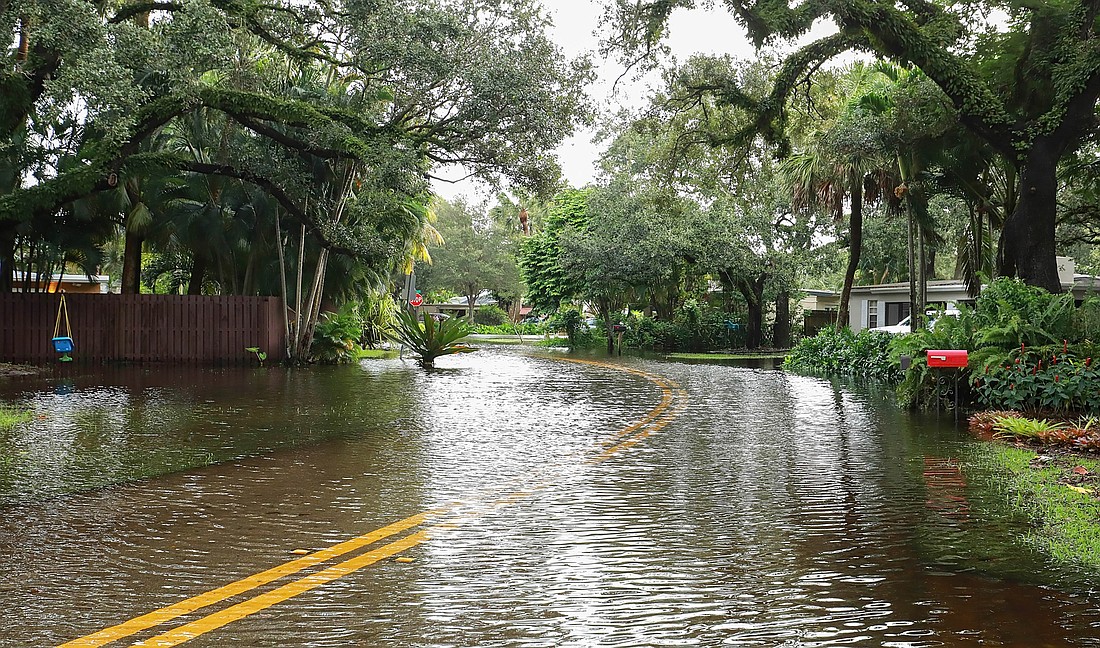- January 26, 2025
-
-
Loading

Loading

Gov. Ron DeSantis signed into law a pair of bills Wednesday, May 13, that will annually float tens of millions of dollars to help combat the effects of rising sea levels across the state.
The bills, which include creation of a Resilient Florida Grant Program in the Department of Environmental Protection to aid local communities, came only a few years after Republican lawmakers began to openly acknowledge the impacts of climate change.
“We're really putting our money where our mouth is when it comes to protecting the state of Florida and particularly our coastal communities from the risks of flooding and storms,” DeSantis said during an event to sign the bills (SB 1954 and SB 2514) at Rusty Bellies Waterfront Grill in Tarpon Springs.
The legislation also directs the Department of Environmental Protection to conduct a statewide flood risk assessment; requires a three-year statewide flooding and sea-level rise resilience plan; encourages the formation of regional resilience coalitions; and establishes the Florida Flood Hub for Applied Research and Innovation within the University of South Florida’s College of Marine Science.
“We knew where we could no longer stand idly by and not plan for the future, that we needed to be always ready,” said House Speaker Chris Sprowls, a Palm Harbor Republican who was among lawmakers who started telling colleagues they could publicly address climate-change impacts at the end of former Gov. Rick Scott’s second term.
The Personal Insurance Federation of Florida, an insurance industry group, issued a news release that said the new laws will protect Florida homeowners and decrease flood insurance risks. Melissa Roberts, executive director of the American Flood Coalition, said the state’s approach “is now a model for the country.”
Environmental groups have voiced support for the legislation while expressing hope that lawmakers will eventually also address sources of greenhouse gas emissions leading to climate change.
Sprowls said the streets around the Tarpon Springs restaurant become impassable for vehicles whenever there is a significant rainstorm.
“It brings commerce to a standstill,” Sprowls said, adding that lawmakers could “debate all day the whys and the hows” and not do anything to address the issue.
As part of the resiliency effort, lawmakers agreed to divvy up more than $400 million in documentary-stamp tax dollars, which are collected on real estate transactions and in the past have been targeted toward what is known as the Sadowski Trust Fund for affordable housing. Lawmakers approved directing $200 million to affordable housing, with $111.7 million going to sea-level rise efforts and $111.7 million going to sewage treatment projects. A bill that would make those funding changes (SB 2512) has not formally gone to DeSantis.
The Legislature also agreed to direct $500 million in federal stimulus money to what is known as Resilient Florida Trust Fund.
Sprowls said there is “no question” that the state will have significant flooding, similar to how Florida knows it will have hurricanes.
“The question is, where will they happen? And how bad will they be?” he said. “And while we look forward and we always plan for these disasters, so too, we must plan for resiliency and coastal flooding throughout our state.”
Senate President Wilton Simpson, R-Trilby, said the state is “finally elevating flood mitigation as a critical part of Florida's public safety infrastructure.”
“With 35 coastal counties containing the majority of our population and economy, our risks are only going to increase,” Simpson said. “Over time, the combined effects of sea-level rise, storm surges and extreme rain events will have a significant impact.”
The two bills are tied to a separate measure (SJR 1182) that will ask voters in 2022 to approve a property-tax break for people who elevate homes to address potential flooding.
The issue involves the assessed values of homes for tax purposes when they are elevated. Under the proposal, such improvements would not be considered in determining assessed values if the work meets National Flood Insurance Program and Florida Building Code elevation requirements.